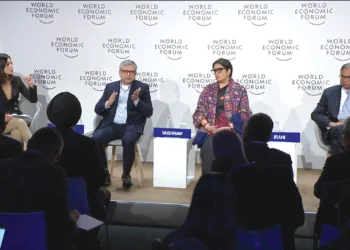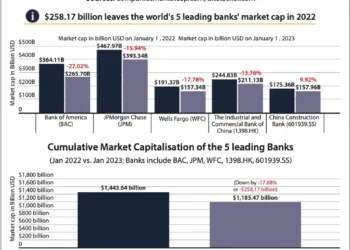Liu He, Vice-Premier of the People’s Republic of China, State Council of the People’s Republic of China, speaks at Davos 2023. He calls for international cooperation, a global response to climate change, and placing economic development as the ‘primary and central task’.
January 17, 2023 Jennifer Paldano Goonewardane.
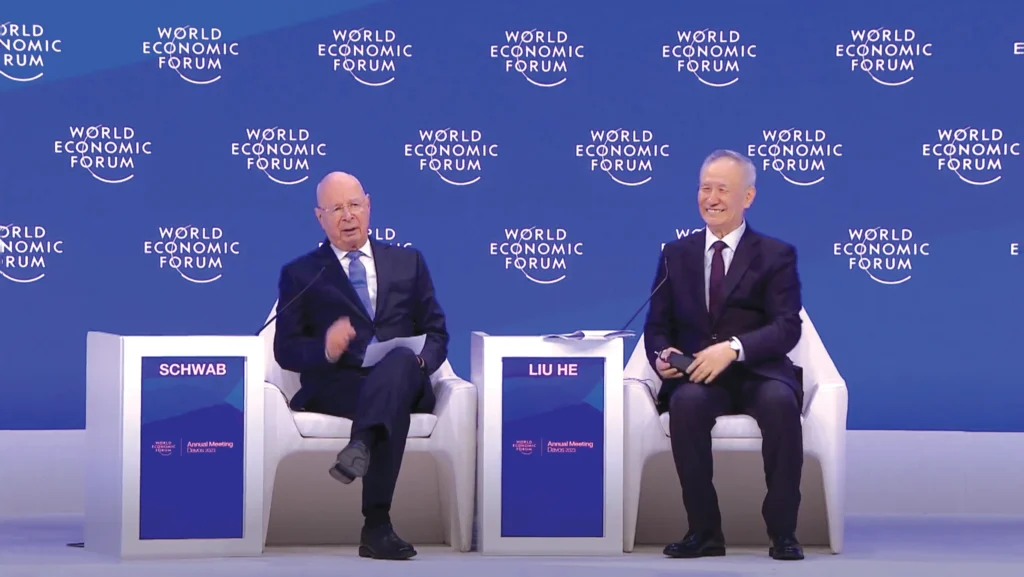
Dr. Klaus Schwab, Founder and Executive Chairman of the World Economic Forum; and Liu He, Vice-Premier of the People’s Republic of China.
Dr. Klaus Schwab – It’s my great pleasure and honor to join His Excellency Liu He, the Vice-Premier of the State Council of the People’s Republic of China. The world has undergone tremendous changes in the past three years with many challenges. The pandemic, the war in Europe, slowing economies, the energy crisis, the food crisis, supply chain instability, and climate change. The world is becoming even more fragmented, and we must seek cooperation in this fragmented world. Since China started its opening up and reforms process over 40 years ago, the country has made great contributions to the development of the global economy. Yet, the world is in transformation. And we are all focused on rethinking our development models. The global community, Your Excellency, is eager to understand the next chapter of China’s development strategy, domestically and globally, particularly after the Communist Party’s 20th Congress. We would like to know the opportunities in China and how we can work together with China to tackle the collective challenges that the world is facing. Cooperation instead of fragmentation.
As the Director of the Office of the Central Financial and Economic Affairs Committee, Director of the Financial Stability and Development Committee of the State Council, head of the leading national group for science and technology and system reform and innovation system development, Vice-Premier Liu has played a key role and keen role in China’s economy, financial and technology sectors as well as China’s international cooperation for over 30 years. He is a recognized leader and a well-known person internationally.
We must always promote all-round opening up. Opening up as a basic state policy is a catalyst for reform and development in China and a key driver of economic progress. China’s door to the outside world will open wider.
Today, we all need to work together to progress in this fragmented world. We firmly believe China will play and can play an important role. So, we’re all keen to hear your perspectives. Mr. Vice-Premier of China, how much will China assume a responsive and responsible role to avoid further fragmentation in the world? Please welcome Vice-Premier Liu He.
Vice Premier Liu He – Dr. Klaus Schwab, ladies and gentlemen, and friends. Good morning. Let me begin by thanking Dr. Schwab for inviting me to Davos again. The last time I came here was in 2018. Over the past five years, we have experienced unexpected events and witnessed profound changes in the world’s economic and political landscape. Therefore, the theme of this year’s annual meeting, ‘Cooperation in a Fragments World,’ cannot be more relevant. Mutual understanding is an important prerequisite for cooperation. We’ve been conducting online communication recently, where we realized that no matter how technologically advanced it is, there is no substitute for in-person meetings. I had several warm meetings with some old friends these two days. I hope I can help you understand the Chinese economy better at this face-to-face event.
In 2022 China completed its major political agenda. We held the 20th National Congress of the Communist Party of China and elected the new central leadership with President Xi Jinping at its core. We drew up an ambitious blueprint for advancing Chinese modernization in the coming five years and beyond. Last month we held the annual Central Economic Work Conference to make plans for this year in line with the developments in the 20th CPC National Congress.
Last year China’s growth was three percent, and we managed to keep jobs and prices stable. The urban surveyed unemployment rate was 5.6 percent, CPI was two percent, and the current account surplus was slightly above two percent of GDP. In 2023, we will continue to work to make progress while maintaining stability and follow a proactive fiscal policy and a prudent monetary policy. We will strive to maintain reasonable economic growth and stabilize prices and jobs.
We must create a world-class, market-oriented business environment underpinned by a sound legal framework. Both government and market activities must stay within the confines of the law.
We will focus on expanding domestic demand keeping industrial and supply chains smooth, supporting the healthy development of the private sector, deepening state-owned enterprise reform, attracting foreign investment, and preventing and diffusing economic and financial risk. If we work hard enough, we are confident that in 2023 China’s growth will likely return to its normal trend. The Chinese economy will see a significant improvement with a noticeable increase in imports, more companies’ investment, and consumption investment return to normal. Over the past ten years, China’s GDP grew from 54 trillion to 121 trillion Yuan. Average life expectancy grew from 74.8 to 78.2 years last year. Our contribution to global growth share reached around 36 percent.
We always bear in mind at least five things in making such achievements. First, we must always take economic development as the primary and central task under the new circumstances guided by the philosophy of innovative, coordinated, green, open, and shared development. High-quality economic development must always be our goal. Second, we must always make establishing a socialist market economy a direction of our reforms. We must let the market play a fundamental role in resource allocation and let the government play a better role. Some people say that China will go for a planned economy. That is by no means possible. We will stay committed to deepening SOE reform, supporting the private sector and its growth, promoting fair competition, opposing monopoly, and championing entrepreneurship. Third, we must always promote all-round opening up. Opening up as a basic state policy is a catalyst for reform and development in China and a key driver of economic progress. China’s door to the outside world will open wider. Fourth, we must always uphold the rule of law. We must protect property rights and IPRs in accordance with the law. We must create a world-class, market-oriented business environment underpinned by a sound legal framework. Both government and market activities must stay within the confines of the law. Fifth, we must pursue innovation-driven development. We must promote innovation and education, grow human capital faster, have a sound interaction of finance, technology, and industry, and work to boost productivity.
Ladies and gentlemen and friends, the above five points are the important experience we have learned and gained since China started its reforms and opening up. We must stick to them and never waiver in our commitment. Let me also briefly touch upon three issues facing the Chinese economy. First, where we are in resolving financial risk, particularly those in the real estate sector. Second, our thinking on dual circulation. Third, the rationale behind China’s goal of common prosperity. The financial risks that have emerged in China over the past five years result from multiple factors, including macroeconomic downturn, loose financial supervision, imprudent business expansion, and insider control.
We fought a tough battle to address these risks. We dealt with conglomerates as well as small and medium-sized financial institutions of higher risks, disposed of distressed assets, curbed shuttle banking activities, and handled unusual volatility in the capital market. Thanks to these efforts, we have managed to maintain overall financial stability and prevent systemic risks. We are drafting a financial stability law that will provide legal safeguards for diffusing risks and maintaining financial stability as we go forward. The real estate sector is still a pillar of China’s economy. But there have been changes since 2021. The real estate sector accounts for nearly 40 percent of bank lending, around 50 percent of overall local government fiscal resources, and 60 percent of urban household assets. Therefore, we pay much attention to the changes that have taken place, including a rapid decline in property prices and home sales. Many property developers suffered from a liquidity shortage and deteriorating balance sheets. The risk of a handful of leading property developers is particularly noticeable. If not handled properly, risks in the housing sector are likely to trigger systemic risks, which is why we must take prompt steps to address them.
That said, while doing so, we should also prevent possible moral hazards. Here is what we have done. First, we have stabilized expectations by honoring contracts and by protecting property rights. For the twenty-six hundred plus presold but unfinished housing projects that concern 1.88 million people across the country, we have made ensuring their delivery our priority. And this helped prevent panic in the market. Second, we have conducted massive blood transfusions in the real estate sector. The liquidity of real estate companies has been enhanced by fresh bank lending, bond issuance guarantee, and equity financing. Third, we have relaxed restrictions once introduced to address the overheating in the property market to expand demand and enable property developers to generate revenue effectively. Thanks to these efforts, the property market in China has seen a noticeable improvement. Looking ahead, China’s urbanization is still on a fast track, and the enormous potential demand generated in this process will provide a strong underpinning for developing the real estate sector.
Right now, China is stepping up efforts to foster a new development paradigm with domestic circulation as the mainstay and domestic and international circulation reinforcing each other. The focus of domestic circulation is on expanding internal demand, developing a consumption-led growth model, and rebalancing the economy is a logic reflecting international consensus since the financial crisis in 2008. China needs to rebalance, and so does the United States. The world economy needs a rebalancing. However, for domestic circulation to function well, it must rely on an international division of labor and cooperation as well as more foreign trade and investment. Therefore, the new development paradigm of dual circulation is to be pursued in an open economy. China’s national reality dictates that opening up to the world is a must rather than an experience. We must open up wider and make it work better. We oppose unilateralism and protectionism and look forward to strengthening comprehensive international cooperation with all countries for world economic stability and development and the promotion of economic re-globalization.
Now that China has completed the mission of building a moderately prosperous society in all respects, we have come up with a new social development goal of achieving common prosperity. A historic mission that will help us ensure lasting stability is a long-term task requiring an incremental and gradual approach. It is not something to be achieved overnight. Common prosperity, as we see it, is aimed at preventing polarization. We can only attain it through economic development and the hard work of every Chinese. Common prosperity is by no means a synonym for egalitarianism or welfarism. As China grows, all Chinese people will be better off. But that doesn’t mean that their incomes and level of prosperity must be the same. That is to say that there’ll be equal opportunities but no guarantee of equal outcomes. Entrepreneurship is a key factor in wealth creation in society. Therefore, Chinese and foreign entrepreneurs will play an important role as the engine driving China’s historical pursuit of common prosperity. If wealth doesn’t grow, common prosperity will become a river without a source or a tree without roots.
Ladies, gentlemen, and friends, the theme of this meeting, “Cooperation in a Fragmented World,” is highly relevant. As President Xi Jinping noted, changes in our world, times, and history are unfolding unprecedentedly. The world has once again come to a historical crossroads, and its future depends on our choices. As to how we should advance international cooperation, I’d like to share the following three observations with you. First, we must uphold the right principles and maintain an effective international economic order. Under the new circumstances, the traditional way of thinking cannot provide a solution. Hence, we must abandon the Cold War mentality, try to understand the essence of things from the perspective of material duality, endeavor to build a community with a shared future for mankind, and join hands to respond to global challenges. We believe all of us must preserve an equitable international economic order. International division of labor, encouragement of competition, ending monopoly, protection of property rights and IPRs, promoting entrepreneurship and free flow of production factors, fair distribution, ensuring macroeconomic stability, and a strong social safety net are still economic principles relevant today. The government has a key role to play in major issues. Despite temporary resistance and some setbacks, we must have the courage to uphold truth and the law of economics and pragmatically address complex issues with plain and simple solutions.
Second, we must strengthen international macro policy coordination and strike a good balance between inflation and growth. To tame inflation, some countries have chosen a policy that will likely result in the hike- recession-recovery loop. But it is important to note that inflation this time is driven by multiple factors, hence its complicated nature. Besides the demand side, supply-side measures are also needed to repair the supply chains and preserve energy and food security. A joint response to this challenge requires international cooperation and the maintenance of peace. We call for more attention to the negative spillover effect of major countries’ rate hikes on emerging markets and developing countries and to not add to their debt or more financial risks. We also stand ready to work with all parties to find a solution to the debt issues of some developing countries.
Third, we need a global response to climate change. Most countries are keenly aware of the urgency for climate governance and the need for common actions. The COVID-19 pandemic has revealed a possible connection between climate change and the public health crisis. It is an area where effective international cooperation is needed. China will honor its commitments to the international community, push for global cooperation on climate change, and work with other countries to tackle its serious challenges. How to strengthen cooperation in a fragmented world is a real problem we all face. We must face it squarely, dig deep into the causes of fragmentation, promote positive-sum games, identify possible convergence areas of cooperation and explore the mechanisms for doing so. We must all work together to safeguard broad peace firmly. We should be grateful that this year’s Davos forum presents us with an opportunity to do just that.
I wish the forum success and hope it will strengthen cooperation and preserve peace in a fragmented world. Thank you for your attention.
Dr. Klaus Schwab – Thank you very much Vice-Premier. We have time for two questions. I want to follow up on what you mentioned at the end to come back to China’s carbon neutrality goal. China has announced its goal to be carbon neutral by 2060 and to make a strong contribution to achieving the Paris objectives. What practical, decisive steps will you take, and what role can global collaboration play?
Vice-Premier Liu He – Thank you, Dr. Schwab, for your question. Carbon peaking before 2030 and carbon neutrality before 2060 are sound commitments the Chinese Government has made to the world, and we will strive to achieve them. To achieve that, we are making efforts in several aspects. First, we are adjusting the energy structure. We will increase the share of renewable and new energy and enhance the efficiency of traditional energy sources, including carbon capture and storage. These are important. In the meantime, China’s national reality dictates that we also need to promote safe and clean use of nuclear power. Second, we will focus on key areas of carbon reduction. If we can focus on these key areas, we will be able to cut 80 percent of emissions, including from power generation, construction materials, and steel. We are also promoting change in consumption behavior and changing the traditional manufacturing sector. Third, we think institutional arrangements are crucial. We have made a 1+N policy framework. We are promoting the boarding of carbon trade and green finance, public investment, and taxation. Fourth, we must strengthen international cooperation. We’re working with the United States, and under the United Nations, APAC, and G20 frameworks, we have established a series of mechanisms. We have already worked with the European Union on cities and industrial parks. We are working with the European Union on technology and collaborating with emerging markets and developing countries. For instance, in the Belt and Road cooperation, we have announced the end of building new coal power plants as part of international cooperation. We will also provide financing to countries in need.
I also like to talk about Chinese modernization. Carbon neutrality is China’s international obligation. It’s needed for China to drive internal growth. It is not imposed on us. Rather it is something that we want to do. The supply of primary products requires international exchanges. We have a massive manufacturing industry in China and advancing industrialization and urbanization. China must make changes to its development model and promote green development. I’ve noticed that the idea of paradigm change in green development was raised not long ago. The reduction of carbon emissions and carbon neutrality are crucial to China’s survival. We’re also taking a holistic approach to conserving mountain water, forest, farmland, and grassland ecosystems. We know that lucid water on large mountains is invaluable, and we also need to promote green development among the public. Thank you.
Dr. Klaus Schwab – Thank you Vice-Premier in this context, we appreciate China’s commitment to within the framework to plant a one trillion trees project to plant 65 billion trees in the coming years.
Everyone is keenly interested Vice-Premier because there have been so many different reports about the COVID situation in China, creating concerns about the health situation, the impact on the economic growth potential, and the resilience and reliance on the supply chains. Enlighten us on the situation and what we can expect of the final normalization of the situation.
Vice-Premier Liu He – Thank you very much for your question. As you mentioned, we are shifting our focus from dynamic zero COVID to preventing severe cases. It started on 8th December last year, and since 8th January this year, we have begun to manage COVID as a class B infectious disease. That is a signal of reopening. First, the COVID situation is steadying and has passed the infection peak. Members of our society have returned to normal. There’s a short period between the infection peak and returning to normal, which is beyond our expectations. Second, living and production have been fully restored, and catering, tourism, and other consumption areas have been restored to normal.
I have received quite a surprising number from the Transportation Department that this year’s Chinese Spring Festival will see some five billion trips made on an enormous scale. That is why I said life has returned to normal in China. Third, the priority is to help the elderly and those with underlying conditions, including diabetes, high blood pressure, etc. Now we are working to address the priorities. As things stand, we can ensure the supply of hospitals, hospital beds, doctors, nurses, and medicine. Finally, all of you, my foreign friends, are welcome to visit China. The policy we’re taking right now is travelers only need 48-hour PCR test results upon entry, and there’s no quarantine and no other additional requests. All of you, friends from the international community, are most welcome to visit China. We will provide you with the best services. We need some time for transition on certain issues, but overall, there is no problem. I met several old friends yesterday. They told me they wanted to visit China for the Boao Forum for Asia, the high-level forum for development. That is also proof that things have normalized. Thank you for your question and thank you for your attention.
Dr. Klaus Schwab – Thank you Vice-Premier. We highly appreciate that you came to Davos. You came here with an important delegation just before the Spring Festival. Thank you for sharing with us the latest policies of the government of China, and on behalf of everyone here, I want to wish you a good year of the rabbit. Thank you very much.
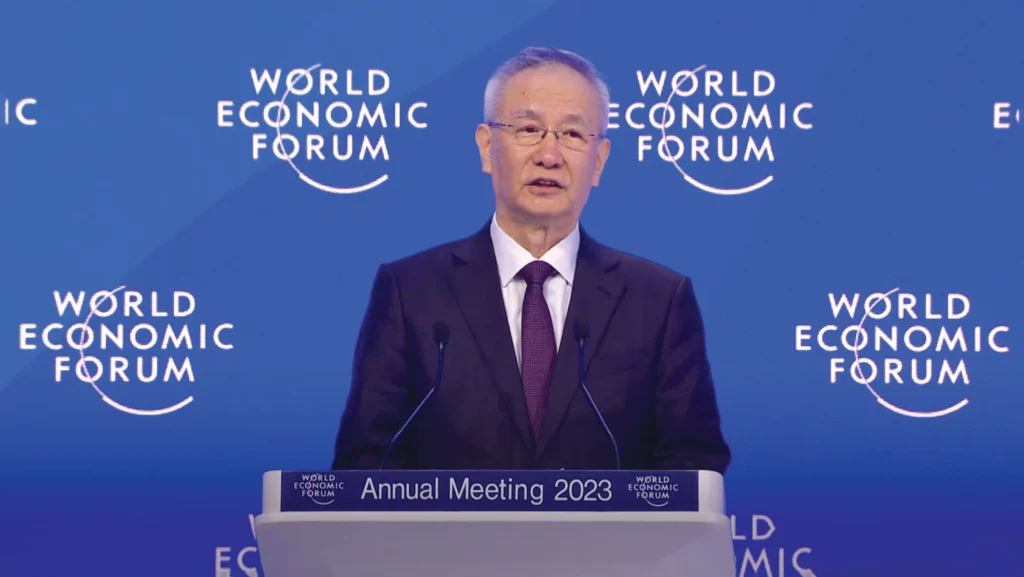
Liu He, Vice-Premier of the People’s Republic of China.
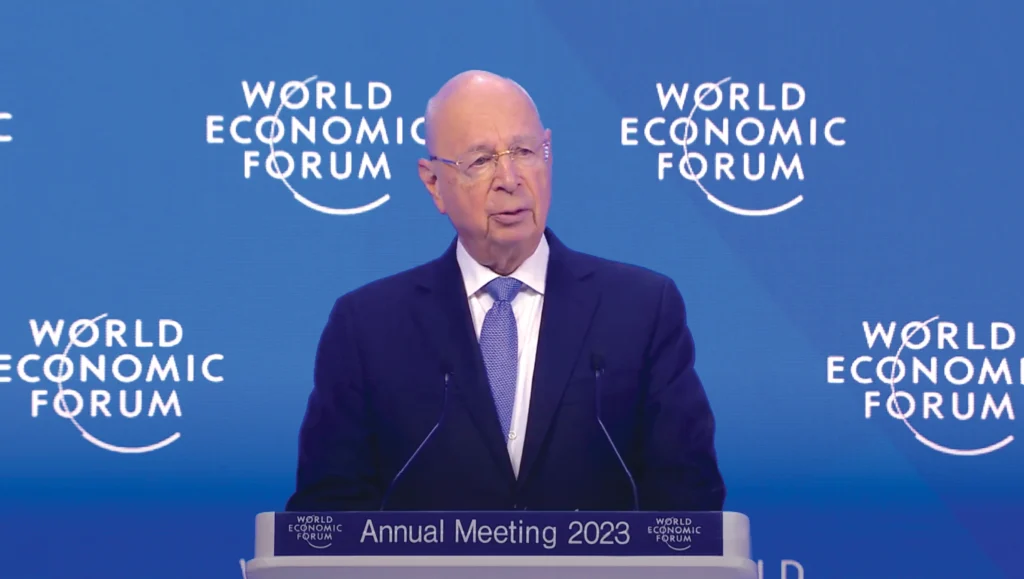
Dr. Klaus Schwab, Founder and Executive Chairman of the World Economic Forum.



